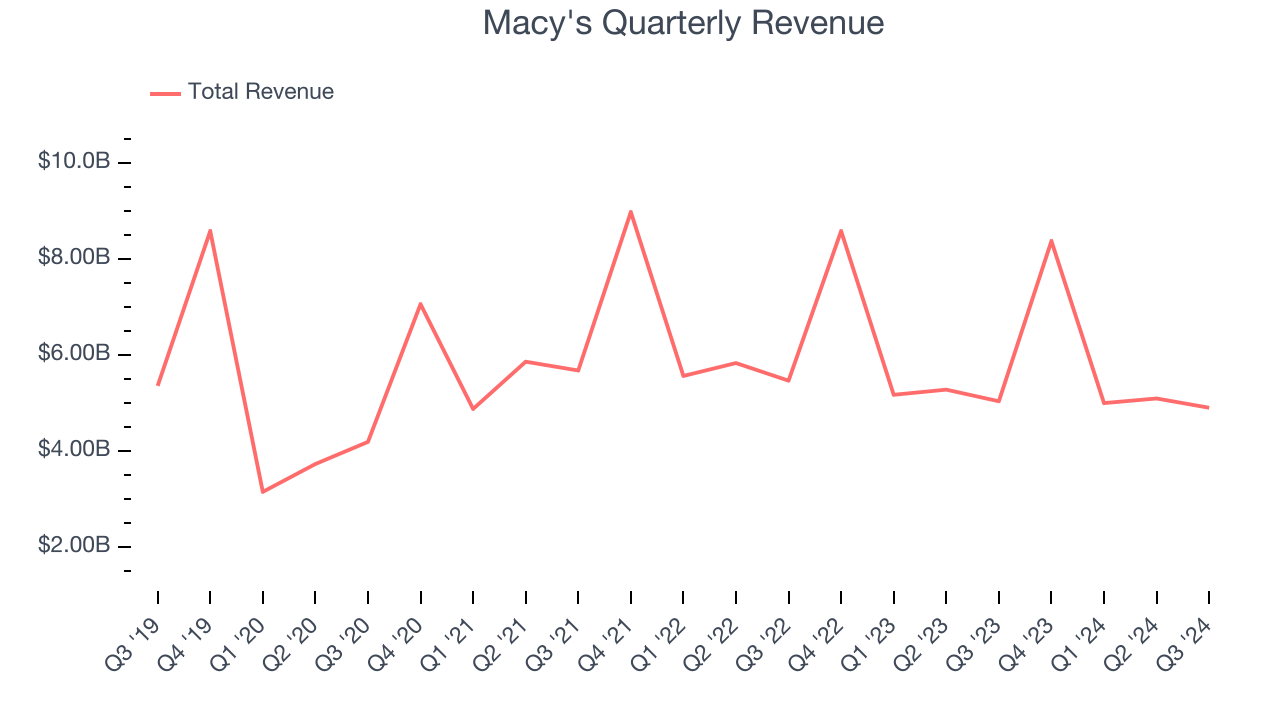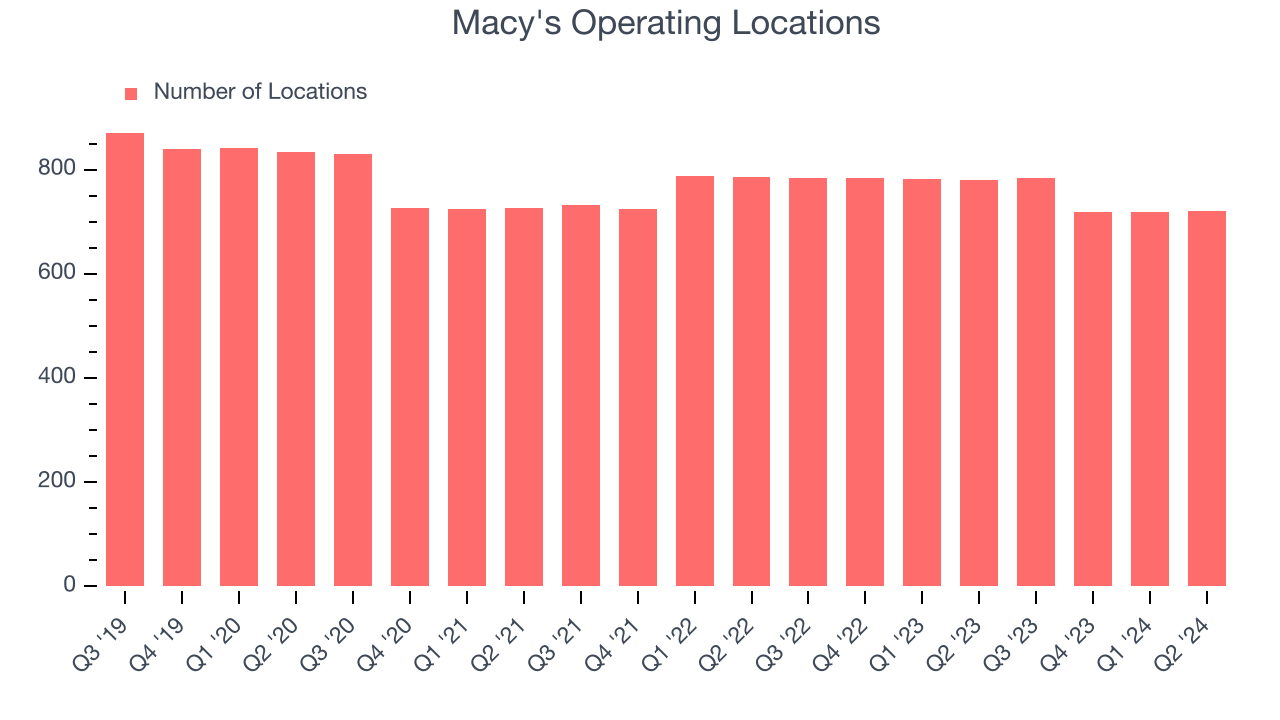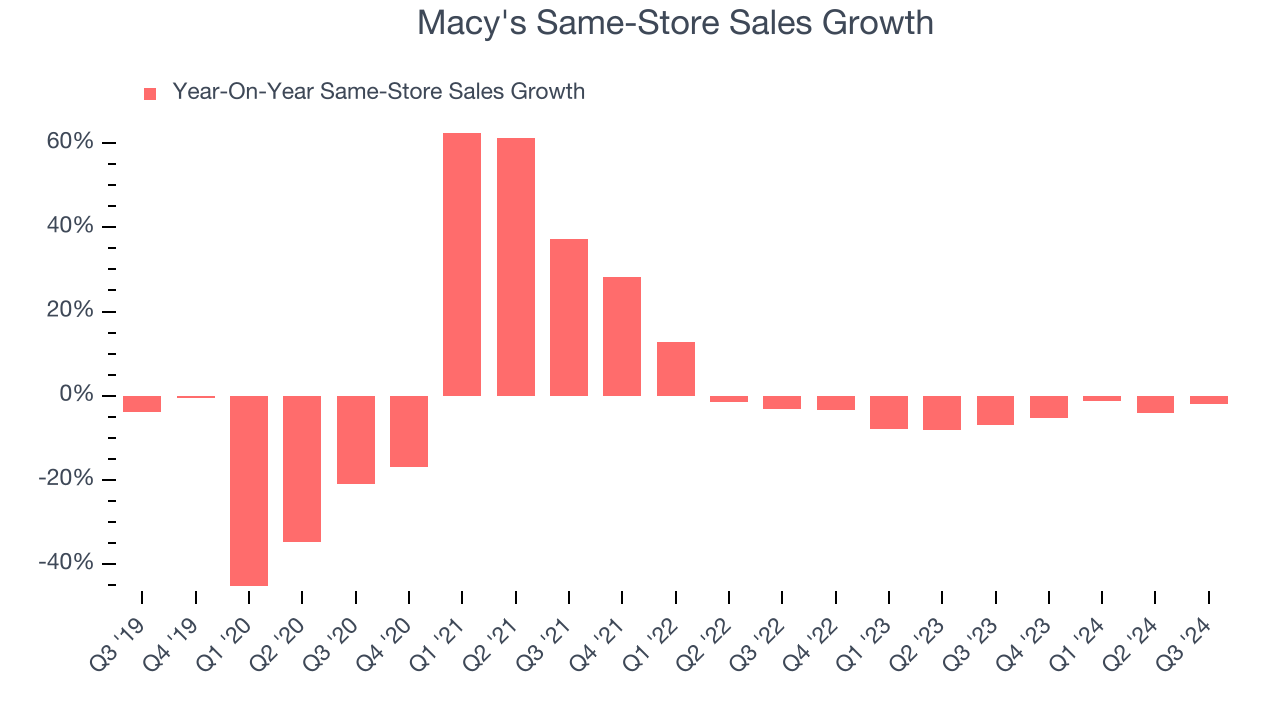
Department store chain Macy’s (NYSE:M) reported Q3 CY2024 results topping the market’s revenue expectations, but sales fell by 2.7% year on year to $4.90 billion. The company’s full-year revenue guidance of $22.4 billion at the midpoint came in 1.2% above analysts’ estimates. Its non-GAAP profit of $0.04 per share was $0.01 above analysts’ consensus estimates.
Is now the time to buy Macy's? Find out by accessing our full research report, it’s free.
Macy's (M) Q3 CY2024 Highlights:
- Macy's confirms no material impact or restatements to previously filed financial statements following completion of delivery expense related investigation
- Revenue: $4.90 billion vs analyst estimates of $4.72 billion (2.7% year-on-year decline, 3.9% beat)
- Adjusted EPS: $0.04 vs analyst estimates of $0.03 ($0.01 beat)
- Adjusted EBITDA: $273 million vs analyst estimates of $272.7 million (5.6% margin, in line)
- The company slightly lifted its revenue guidance for the full year to $22.4 billion at the midpoint from $22.25 billion
- Management lowered its full-year Adjusted EPS guidance to $2.38 at the midpoint, a 12.8% decrease, due to expectations of lower gross and EBITDA margins
- Operating Margin: 1.3%, in line with the same quarter last year
- Free Cash Flow was -$384 million compared to -$298 million in the same quarter last year
- Same-Store Sales fell 2% year on year (-7% in the same quarter last year)
- Market Capitalization: $4.64 billion
“Our third quarter results reflect the positive momentum we are building through our Bold New Chapter strategy,” said Tony Spring, chairman and chief executive officer of Macy’s,
Company Overview
With a storied history that began with its 1858 founding, Macy’s (NYSE:M) is a department store chain that sells clothing, cosmetics, accessories, and home goods.
Department Store
Department stores emerged in the 19th century to provide customers with a wide variety of merchandise under one roof, offering a convenient and luxurious shopping experience. They played an important role in the history of American retail and urbanization, and prior to department stores, retailers tended to sell narrow specialty and niche items. But what was once new is now old, and department stores are somewhat considered a relic of the past. They are being attacked from multiple angles–stagnant foot traffic at malls where they’ve served as anchors; more nimble off-price and fast-fashion retailers; and e-commerce-first competitors not burdened by large physical footprints.
Sales Growth
A company’s long-term performance is an indicator of its overall quality. While any business can experience short-term success, top-performing ones enjoy sustained growth for years.
Macy's is one of the larger companies in the consumer retail industry and benefits from a well-known brand that influences consumer purchasing decisions. However, its scale is a double-edged sword because there are only a finite number of places to build new stores, making it harder to find incremental growth.
As you can see below, Macy’s demand was weak over the last five years (we compare to 2019 to normalize for COVID-19 impacts). Its sales fell by 1.7% annually as it closed stores and observed lower sales at existing, established locations.

This quarter, Macy’s revenue fell by 2.7% year on year to $4.90 billion but beat Wall Street’s estimates by 3.9%.
Looking ahead, sell-side analysts expect revenue to decline by 9.5% over the next 12 months, a deceleration versus the last five years. This projection is underwhelming and indicates its products will face some demand challenges.
Here at StockStory, we certainly understand the potential of thematic investing. Diverse winners from Microsoft (MSFT) to Alphabet (GOOG), Coca-Cola (KO) to Monster Beverage (MNST) could all have been identified as promising growth stories with a megatrend driving the growth. So, in that spirit, we’ve identified a relatively under-the-radar profitable growth stock benefiting from the rise of AI, available to you FREE via this link.
Store Performance
Number of Stores
A retailer’s store count influences how much it can sell and how quickly revenue can grow.
Macy's has generally closed its stores over the last two years, averaging 2.5% annual declines.
When a retailer shutters stores, it usually means that brick-and-mortar demand is less than supply, and it is responding by closing underperforming locations to improve profitability.
Note that Macy's reports its store count intermittently, so some data points are missing in the chart below.

Same-Store Sales
The change in a company's store base only tells one side of the story. The other is the performance of its existing locations and e-commerce sales, which informs management teams whether they should expand or downsize their physical footprints. Same-store sales provides a deeper understanding of this issue because it measures organic growth at brick-and-mortar shops for at least a year.
Macy’s demand has been shrinking over the last two years as its same-store sales have averaged 4.9% annual declines. This performance isn’t ideal, and Macy's is attempting to boost same-store sales by closing stores (fewer locations sometimes lead to higher same-store sales).

In the latest quarter, Macy’s same-store sales fell by 2% year on year. This decrease was an improvement from its historical levels. It’s always great to see a business’s demand trends improve.
Key Takeaways from Macy’s Q3 Results
We liked that same-store sales, revenue, and EPS outperformed in the quarter. On the other hand, its full-year gross margin, EBITDA margin, and EPS guidance were all lowered, with EPS guidance missing significantly. Lower gross margin expectations could be a signal that the company is facing more competition, discounting more of its product to move it, or is experiencing higher rates from suppliers. Overall, the quarter was fine, but the guidance is concerning and seems to be driving down shares. The stock traded down 8.1% to $15.40 immediately following the results.
Is Macy's an attractive investment opportunity at the current price? If you’re making that decision, you should consider the bigger picture of valuation, business qualities, as well as the latest earnings. We cover that in our actionable full research report which you can read here, it’s free.














